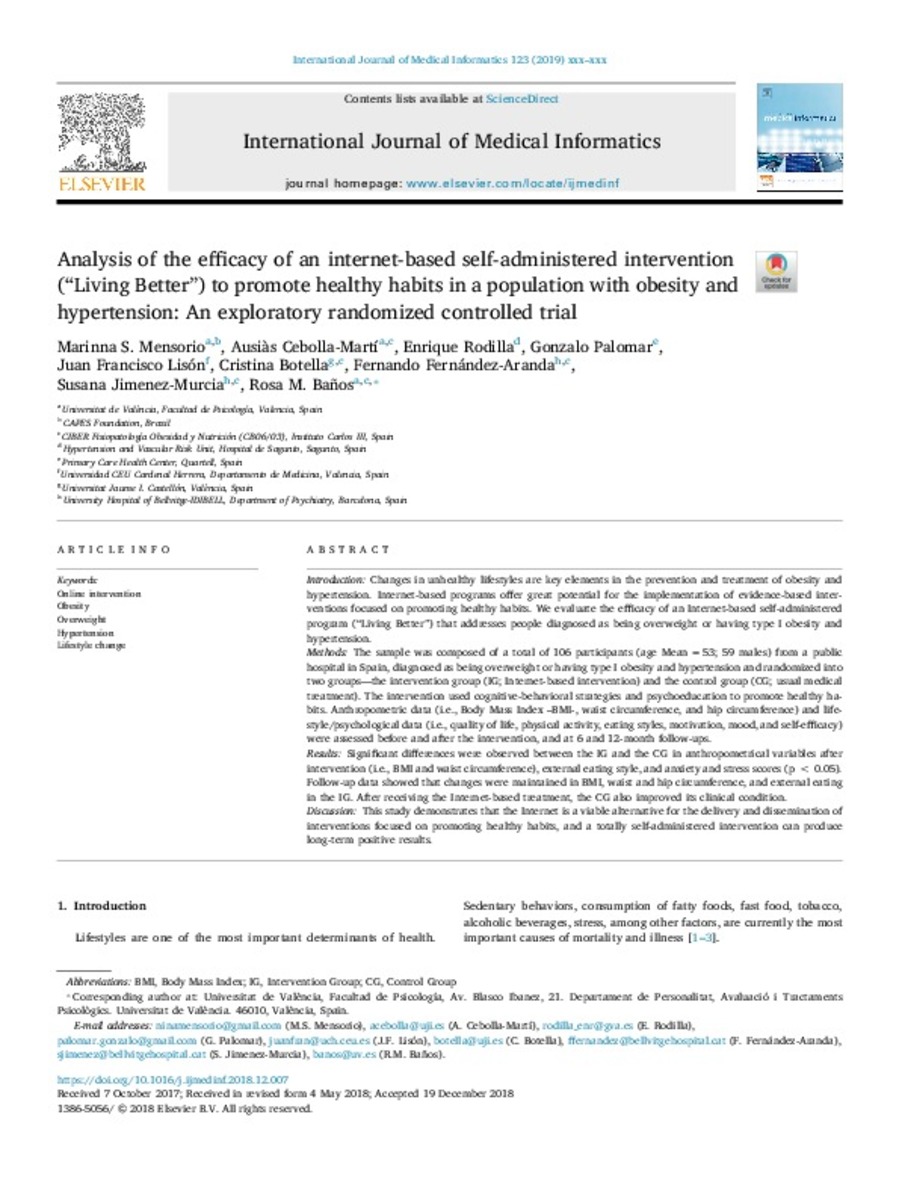Mostrar el registro sencillo del ítem
Analysis of the efficacy of an internet-based self-administered intervention (“Living Better”) to promote healthy habits in a population with obesity and hypertension: An exploratory randomized controlled trial
| dc.contributor.author | Mensorio, Marinna S. | |
| dc.contributor.author | Cebolla Marti, Ausias | |
| dc.contributor.author | Rodilla, Enrique | |
| dc.contributor.author | Palomar, Gonzalo | |
| dc.contributor.author | Lisón, Juan | |
| dc.contributor.author | Botella, Cristina | |
| dc.contributor.author | Fernández Aranda, Fernando | |
| dc.contributor.author | Jiménez-Murcia, Susana | |
| dc.contributor.author | Baños, Rosa Maria | |
| dc.date.accessioned | 2019-03-11T12:04:02Z | |
| dc.date.available | 2019-03-11T12:04:02Z | |
| dc.date.issued | 2019-04-01 | |
| dc.identifier.citation | MENSORIO, Marinna S., et al. Analysis of the efficacy of an internet-based self-administered intervention (“Living Better”) to promote healthy habits in a population with obesity and hypertension: An exploratory randomized controlled trial. International Journal of Medical Informatics, 2019, 124: 13-23. | ca_CA |
| dc.identifier.uri | http://hdl.handle.net/10234/181811 | |
| dc.description.abstract | Introduction: Changes in unhealthy lifestyles are key elements in the prevention and treatment of obesity and hypertension. Internet-based programs offer great potential for the implementation of evidence-based interventions focused on promoting healthy habits. We evaluate the efcacy of an Internet-based self-administered program (“Living Better”) that addresses people diagnosed as being overweight or having type I obesity and hypertension. Methods: The sample was composed of a total of 106 participants (age Mean = 53; 59 males) from a public hospital in Spain, diagnosed as being overweight or having type I obesity and hypertension and randomized into two groups—the intervention group (IG; Internet-based intervention) and the control group (CG; usual medical treatment). The intervention used cognitive-behavioral strategies and psychoeducation to promote healthy habits. Anthropometric data (i.e., Body Mass Index –BMI-, waist circumference, and hip circumference) and lifestyle/psychological data (i.e., quality of life, physical activity, eating styles, motivation, mood, and self-efcacy) were assessed before and after the intervention, and at 6 and 12-month follow-ups. Results: Signifcant differences were observed between the IG and the CG in anthropometrical variables after intervention (i.e., BMI and waist circumference), external eating style, and anxiety and stress scores (p < 0.05). Follow-up data showed that changes were maintained in BMI, waist and hip circumference, and external eating in the IG. After receiving the Internet-based treatment, the CG also improved its clinical condition. Discussion: This study demonstrates that the Internet is a viable alternative for the delivery and dissemination of interventions focused on promoting healthy habits, and a totally self-administered intervention can produce long-term positive results. | ca_CA |
| dc.format.extent | 11 p. | ca_CA |
| dc.format.mimetype | application/pdf | ca_CA |
| dc.language.iso | eng | ca_CA |
| dc.publisher | Elsevier | ca_CA |
| dc.rights | © 2018 Elsevier B.V. All rights reserved. | ca_CA |
| dc.rights.uri | http://rightsstatements.org/vocab/InC/1.0/ | * |
| dc.subject | online intervention | ca_CA |
| dc.subject | obesity | ca_CA |
| dc.subject | overweight | ca_CA |
| dc.subject | hypertension | ca_CA |
| dc.subject | lifestyle change | ca_CA |
| dc.title | Analysis of the efficacy of an internet-based self-administered intervention (“Living Better”) to promote healthy habits in a population with obesity and hypertension: An exploratory randomized controlled trial | ca_CA |
| dc.type | info:eu-repo/semantics/article | ca_CA |
| dc.identifier.doi | https://doi.org/10.1016/j.ijmedinf.2018.12.007 | |
| dc.rights.accessRights | info:eu-repo/semantics/openAccess | ca_CA |
| dc.relation.publisherVersion | https://www.sciencedirect.com/science/article/pii/S1386505618304647 | ca_CA |
| dc.date.embargoEndDate | 2020-04-01 | |
| dc.contributor.funder | CBER Fisiopatología de la Obesidad y Nutrición (CIBERobn) ; CAPES/Brazil (Coordination for the Improvement of Higher Level Personnel) | ca_CA |
| dc.type.version | info:eu-repo/semantics/acceptedVersion | ca_CA |
Ficheros en el ítem
Este ítem aparece en la(s) siguiente(s) colección(ones)
-
PSB_Articles [1292]
Articles de publicacions periòdiques







